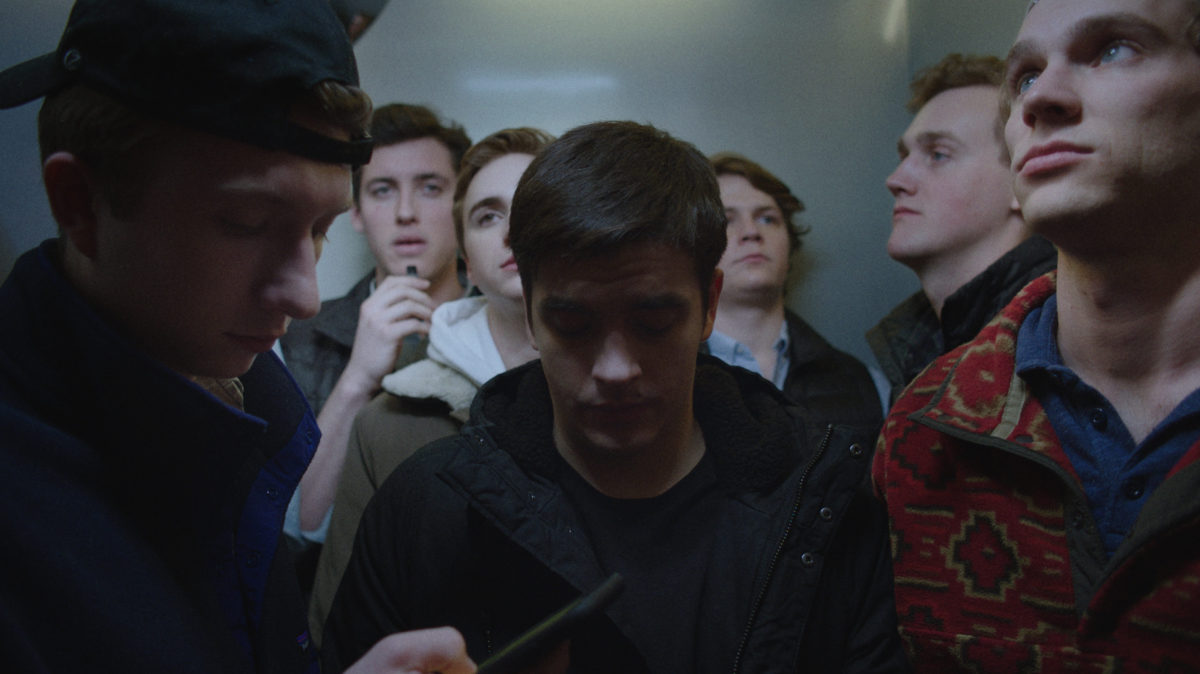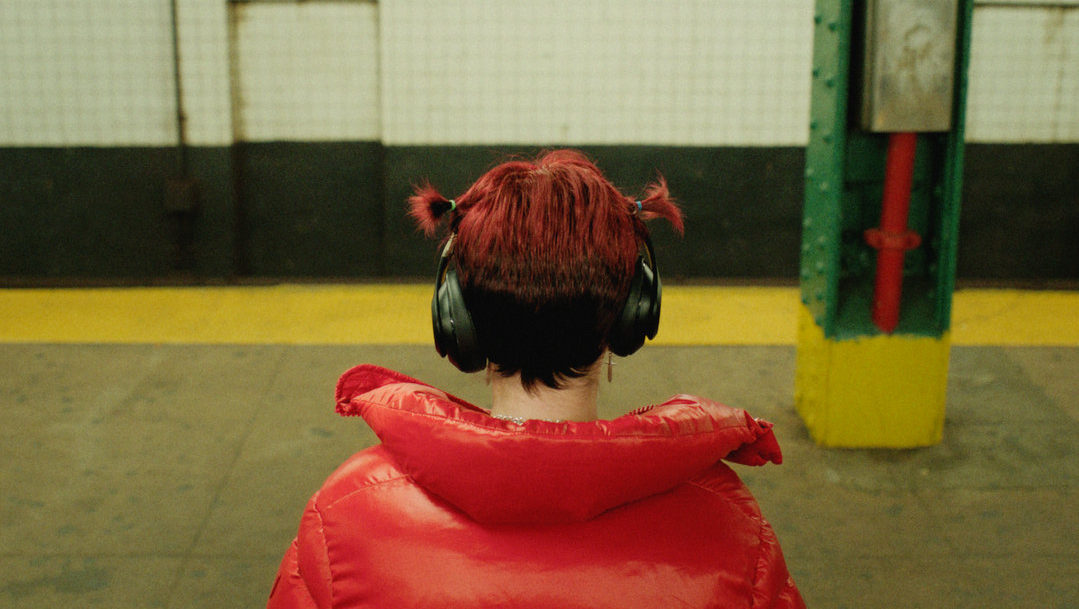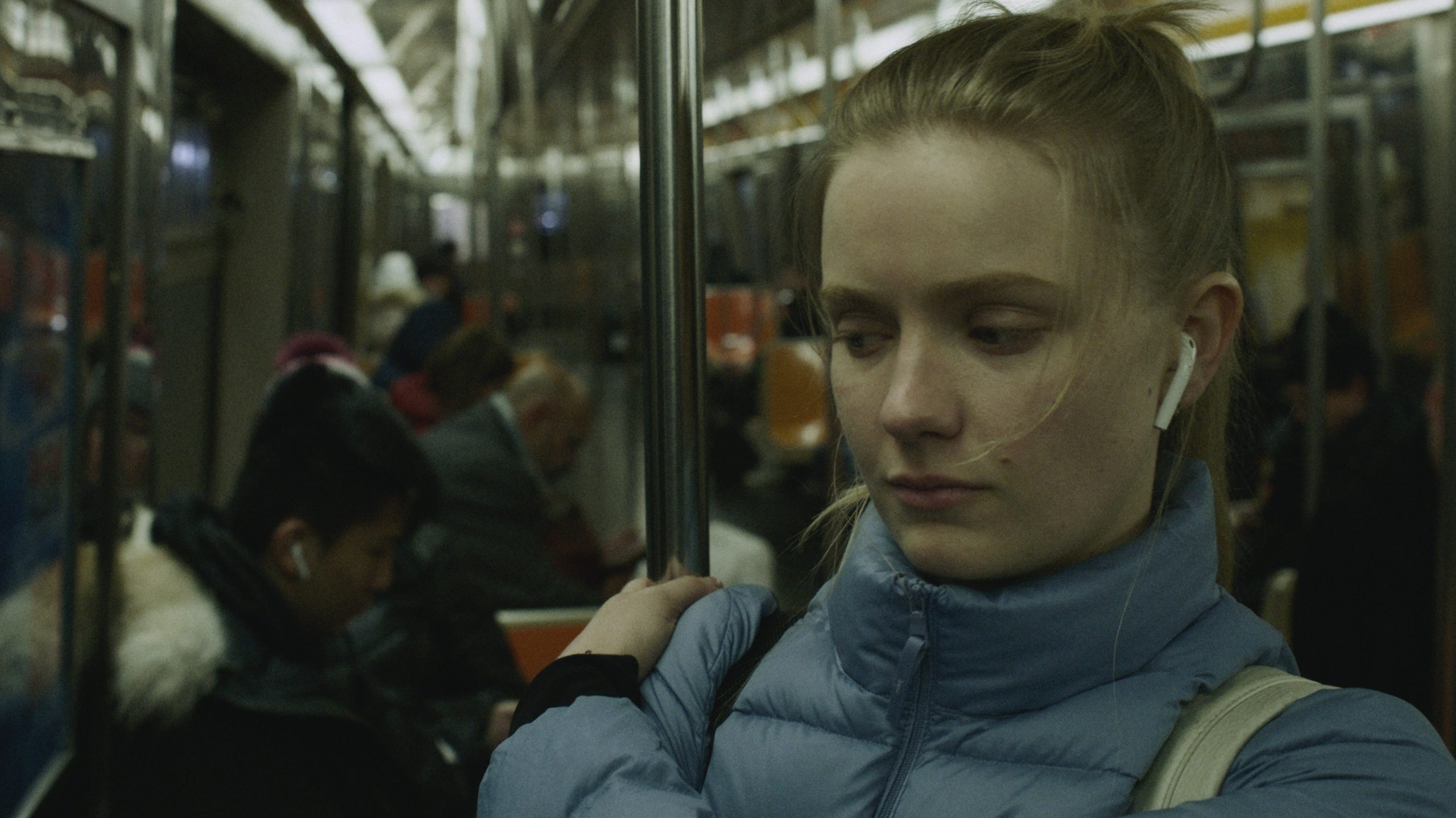
Look At Me is a short narrative drama, which Nika Fehmiu wrote, produced, and directed. It is a story about the different ways in which we prioritize our individual selves above all else, and the consequent inability, fear, and assumed threat of acknowledging another’s humanity. It takes place on a New York City winter night, where the fate of a young intoxicated boy is determined by his brief encounters with strangers, exposing a deeper underlying American truth. Nika’s fellow producers included Hannah Vicente Kliot and Anton Vicente Kliot. The executive producer was Harry Klein. The incredible director of photography for the film was Wayland Bell. Sound design was done by Dylan Hurley and the original score was composed by Curtis Colton Green. Hadley Robinson (Little Women, Utopia) played the yoga girl, Juliette Alice Gobin was the girl with red hair, and Connor Vasile played the lead. They’re all forces to be reckoned with.
What is your experience working on the story, screenplay, production, premiere, and marketing?
Nika Fehmiu (NF): I wrote the script at the beginning of 2018. It originally started as a screenplay for a competition with the prompt “time”, but it quickly developed into something else. I started thinking of the ways we (people) are always trying to move forward, rarely stopping to truly look and see one another. So I began further exploring this American inability to genuinely and deeply connect – a topic I’d spent much time mulling over.
Once I finished the script, I began looking for collaborators and producers. We shot over a weekend at the start of January 2019 – the coldest three days that winter in NYC. We had an incredible team that seamlessly handled all the challenges of guerilla-filmmaking, along with no sleep. I was also lucky to work with such wonderful actors like Hadley Robinson, Juliette Alice Gobin, and Connor Vasile. We were accepted to have our world premiere in competition at the Tribeca Film Festival, but unfortunately due to the Covid-19 Pandemic, it was postponed. As a response, Tribeca decided to move part of the festival online. The Tribeca Film Festival originally started as a response to 9/11 in 2001, a way to come together and grow stronger in times of great adversity. Their decision to go online during this pandemic and time of self-isolation was an innovative and inspiring continuation of that beautiful legacy.

It is a true demonstration of the New York Spirit and a testament that the show will go on. I am grateful and humbled that our film gets to be a part of this noble response. I think connecting through art and storytelling is never as vital and necessary as it is in trying-times like these. We had no marketing campaign besides running our Instagram pages and our website
How did you put the crew and cast together? Did you start writing with a known cast?
Nika Fehmiu (NF): Casting was done either through prior collaborations, recommendations of friends and colleagues, and by using casting platforms like acting studios. We found Connor Vasile by doing a casting call through one of NYU’s acting studios. We saw a bunch of people but had great difficulty casting the part, given how specific it was, from physicality and ethnicity to temperament and talent. But after Connor auditioned, we immediately cast him. He was perfect for the part. I was very lucky in finding Hadley. I went to Middlebury College, and she grew up in the town of Middlebury, so we had a mutual friend who connected us. Hadley had just graduated from Juilliard and been cast in Gerwig’s “Little Women”.
We met over drinks in the fall of 2018 and I knew immediately, she’s a raw genuine talent; you can feel it deep in her soul. So I cast her on the spot, waited for her to finish shooting “Little Women”, and then we began working together. I also had the great joy of working together with Juliette Alice Gobin, another good friend from Middlebury who I had collaborated with before. I love working with Juliette because she possesses this paradoxical fragility and durability; a palpable strength yet open vulnerability. I gathered the crew by reaching out to people I had worked with in the past and by getting recommendations from fellow colleagues.
What and how long did it take to complete the script? (Was it a team effort or was it solo?)
NF: The script probably took me about two months to complete. The story itself was pieced together by various incidents I’d observed or been involved in, by creating characters that all stemmed from different versions and identities of myself. So in a way, it was somewhat inspired by a series of true events. I sent multiple versions to my producers, Hannah and Anton, as well as Wayland, who all provided meaningful feedback for revisions. I also was lucky to receive input from a few close friends and family.

During the film production, what scene (that made the cut) was the hardest to shoot? And why?
NF: The hardest scene to shoot was definitely everything shot on the subway platform. We only had a skeleton crew to work with. I had no monitor and could not watch my actor’s performances without getting into the shot, so it was truly blind-directing on my end. We had no control of trains arriving and leaving the station, nor civilian bystanders – so sound and continuity were quite difficult to maintain. In an attempt to avoid major food traffic, we shot in the middle of the night, so we were also on a tight clock. Editing these scenes was a challenge but we definitely got enough material to make it work. The rehearsals we had done in advance also ensured impeccable performances by the actors, even though I was unable to see them in real-time.
What worked better in this latest production that mightn’t have worked so well in the last one you did?
NF: This is a tricky question since this was my first independent short film. All my other films had been student shorts up until now. For this project, I had a full crew for the first time along with a budget, which was a game-changer. I think everything that was done differently for this film would have been beneficial in prior productions as well.
You must have donned several hats on this film, the measure of your input required intellect, effort, tenacity, skill. What did it take you to put out all these qualities to get the film done?
NF: To make an independent short at this stage in a young filmmaker’s career requires a lot of persistence, stubbornness, and resilience. You have to be prepared to make sacrifices and take on more responsibilities than you can handle because otherwise it won’t get done. Nobody is going to care about this short as much as you. Unfortunately, there aren’t enough systems of support for these kinds of projects. Grants and fiscal sponsorship programs are limited but they’re out there. You just have to keep pushing, listening to the no’s and the rejections, and find ways to make it happen regardless. Start with guerrilla-filmmaking. You have to be ready to respond to every potential challenge and barrier in new and innovative ways because there will be many. But most importantly, find the collaborators who will care about the project as you do, establish a strong team, because when push comes to shove, the ability to lean on them will be priceless. For me, that person was my director of photography Wayland Bell.

What about independent filmmaking and the business do you still struggle with?
NF: Funding all of my future projects. I have yet to earn any money as a writer or director. My living is mostly made from freelancing as an assistant editor, DIT, still photographer, and the occasional service industry jobs.
Where do you think your strengths lie as a producer?
NF: You have to be ready to multitask and wear many hats. I was a producer, a line producer, an accountant, the production manager, the post-production coordinator, etc, etc. I think the only thing that can fuel that ability to play so many roles is “passion for the project”.
Let’s talk about finance, How did you finance the film?
NF: We were accepted into the IFP Fiscal Sponsorship Program, which helped us collect tax-deductible donations through friends and family. We held a fundraising dinner where we pitched the film. We were able to raise a little over 10k.
How much did you go over budget? How did you manage it?
NF: We did not go over budget. I was the accountant for the film so I kept strict tracking of all expenses and receipts. I planned out all spending based on our budget and made sure we stuck to it exactly.
How important is marketing? Do you think a project can make a dent without it nowadays?
NF: We didn’t have any marketing for this film, besides our Instagram account, @lookatme_shortfilm. I am not well versed in marketing, besides the fact that I know it is extremely powerful and I truly don’t know if a film can make a dent without it nowadays. My hope is that great art has the ability to push through the surface and distinguish itself. The realist in me maybe a bit more pessimistic and say that few of us stand a chance without marketing, unfortunately.
What do you hope audiences will get from the presentation of your film?
NF: I chose to tell this story to question our individual and collective priorities, and explore how this shared system of values can ultimately lead to dire consequences. I can only hope that it will inspire a moment of contemplation, perhaps giving pause before looking past another person’s humanity.
What else have you got in the works?
NF: I have a couple of projects in the works. I’m currently developing my first feature and writing my first series. I also have found myself immersed in two accidental quarantine projects- one is a collection of animated shorts based on the moments that people have felt the most alive and the second is a camcorder documentary on the year 2020. Needless to say, this strange and complicated period has provided ample time for creative exploration.
Tell us what you think of the interview with Nika Fehmiu What do you think of it? What ideas did you get? Do you have any suggestions? Or did it help you? Let’s have your comments below and/or on Facebook or Instagram! Or join me on Twitter @oladapobamidele
Follow Nika Fehmiu on Social Media
Website
IMDb
LinkedIn
Instagram
Vimeo
Richard Green Documentary, ‘I Know Catherine, The Log Lady’: Premiere in NYC, LA May 9th
Lynchian Doc I Know Catherine, The Log Lady Makes Hollywood Premiere 4/17, Rollout to Follow
In Camera by Naqqash Khlalid Launch on VOD April 29
Naqqash Khlalid’s Directs Nabhan Rizwan. In Camera stars an EE BAFTA Rising Star Award Nominee.
2025 Philip K. Dick Sci-Fi Film Festival Award Winners Announced
Vanessa Ly’s Memories of the Future Awarded Best PKD Feature
Dreaming of You by Jack McCafferty Debuts VOD & DVD for April Release
Freestyle Acquires “Dreaming of You” for April 15th Release
Hello Stranger by Paul Raschid set for London Games Festival & BIFFF
The film Is set for an April 10th Premiere at The Genesis Cinema in London (LGF) and BIFFF
Daydreamers Official Trailer by Timothy Linh Bui: Released by Dark Star Pictures
Daydreamers Vietnamese Vampire Thriller – May 2nd release









